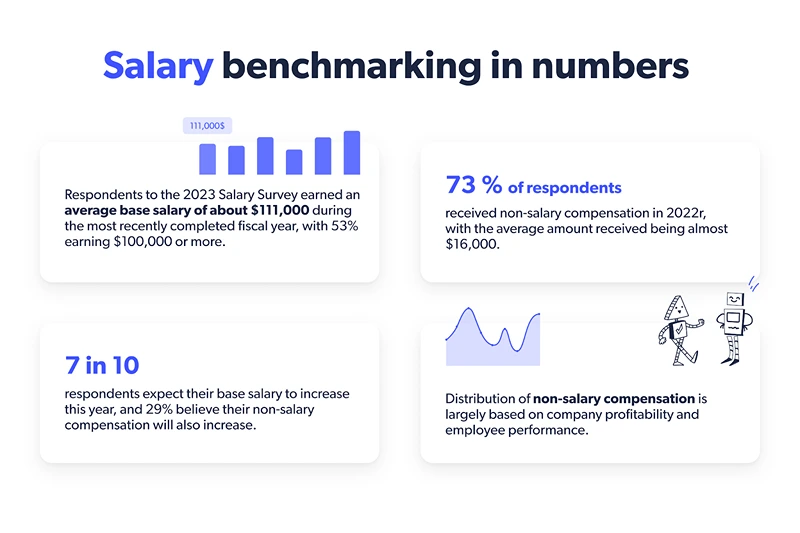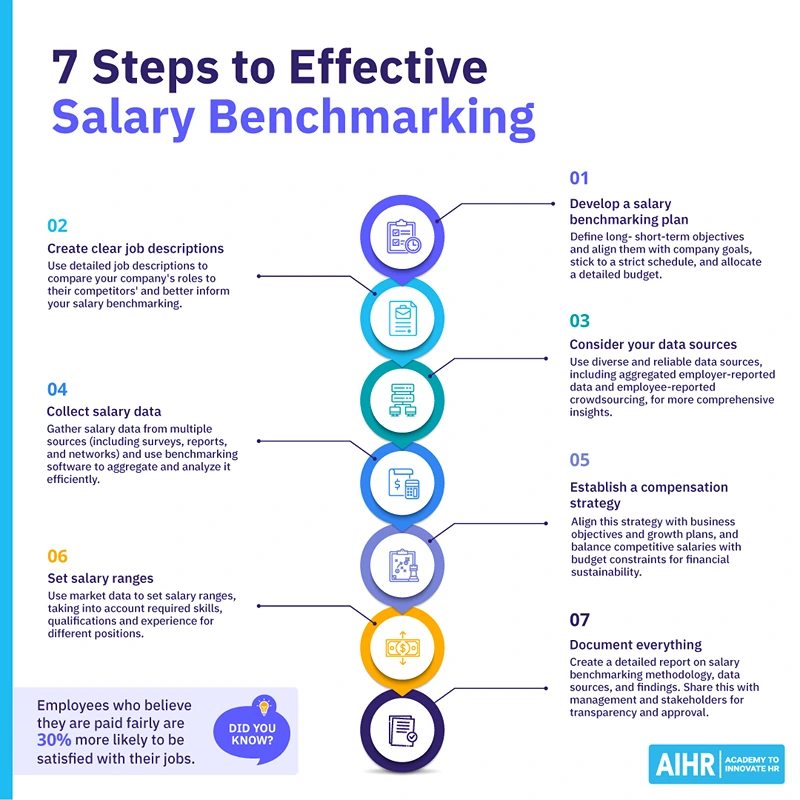Finding skilled employees is challenging and paying them the right salary is even more daunting.
In their report, Payscale indicated that 66% of companies as of 2023 plan to adjust salaries more frequently to stay competitive in the market.
To remain relevant in a shrinking market, firms must make sure that their compensation packages offer sufficient incentives to attract the right candidates, this is where the salary benchmarking tool comes into play. These tools help companies cover salary trends and competitive pay structures to ensure employees are neither overpaid nor underpaid.
However, what is the process of salary benchmarking and what specific compensation benchmarking tools should HR departments use? Let’s take a look to understand it better.
What is Salary Benchmarking?

Image Source: 3rstrategy
Salary benchmarking is the process of comparing how a company’s remuneration framework compares against the market. It entails collecting information from different sources, including salary surveys, job posting and advertising, and market analysis, to find out how much businesses within the particular industry are willing to pay for particular positions.
The goal is simple: to ensure fair pay while remaining competitive.
Consider a case of a particular company that needs to fill in the position of a software engineer. Such an organization would have to look for what competitors pay for similar roles. If the compensation is offered below the expected range, it will be difficult for the organization to get the highly skilled software engineers it wants. Conversely, if the salary is too much, it will affect the budget negatively.
A salary benchmarking tool automates this process by collecting and analyzing salary data, helping HR teams make informed decisions.
Why is Salary Benchmarking Important for Businesses?

Image Source: HRForecast
Salary benchmarking processes involve more than just simple analysis of figures. It is especially important in the talent acquisition and retention of staff. These are the reasons why:
- Attracts Top Talent – Recruiters know what other companies pay when accepting offers. If your pay is too low, they will not accept it as your recruitment rate will lower drastically.
- Reduces Employee Turnover – Offering competitive wages leads to higher employee satisfaction and reduced chances of workers seeking better reward packages elsewhere.
- Optimizes Payroll Costs – Expenses go up if employees are paid too much, and costs will be higher. The right salary will bring down measures to achieve employee satisfaction. Salary benchmarking ensures employers don’t fall into this trap.
- Enhances Employer Branding – Offering competitive payment rates means having more qualified applicants wanting to work in your corporation.
Utilization of salary benchmarking tools ensures businesses do not lose valuable human resources as a result of competitors offering better-paying packages.
How a Salary Benchmarking Tool Helps Businesses Stay Competitive?
Manually researching salaries is fundamentally inefficient. This is where a salary benchmarking tool comes in handy:
1. Real-Time Salary Data
It provides, real-time salary data trends for specific jobs that are no longer based on outdated reports and now derives from real-time multi-sourced job listings and employee reports trends.
2. Industry & Location-Specific Insights
A salary benchmarking tool ensures competitive pay by assisting business wage comparison in different regions and location analysis.
3. Customized Compensation Reports
HR teams can filter data based on job roles, experience levels, and company sizes to create tailored salary structures.
4. Compliance with Wage Regulations
Labor disputes are always a concern and salary benchmarking tools ensure compliance with many industries’ minimum wage laws.
5. Strategic Workforce Planning
By providing labor market insights into salary structures, HR managers can now conveniently forecast hiring budgets and interning attractive packages.
How to Use a Salary Benchmarking Tool for Accurate Insights?

Image Source: AIHR
Investing in a salary benchmarking tool is just the first step—using it effectively is key. Here are some of the effective practices for HR departments:
1. Define Your Benchmarking Criteria
Set a hierarchy of which salary comparison factors are the most important prior to using the tool. Consider:
- Industry
- Job role and experience level
- Company size
- Location
2. Analyze Historical Salary Trends
Analyze past salaries instead of solely categorizing them based on present values. This data will prove helpful in attempting to project future compensation changes.
3. Compare with Competitor Salaries
The salary benchmarking tool helps you review how other industry players set their salary structures as this would help guarantee that your offers would remain competitive.
4. Adjust Pay Strategies Based on Market Data
If the benchmarking data indicates that your salaries are lower than the industry median, then perhaps it is time to make a more competitive offer.
5. Use Salary Benchmarking for Internal Pay Equity
Salary benchmarking isn’t just for hiring—it can be a huge asset for the company in attempts to maintain equity.
Use Case 1: Industry-Specific Salary Benchmarking
It is easy to notice that the trends for salaries do not remain constant across different industries. While some sectors experience rapid changes in salary, others have a more gradual salary progression. This is how industry-specific salary benchmarking works:
Tech Industry
- Challenge: As new skills, such as AI, Cloud Computing, and Cybersecurity, become a norm, salaries in the sector are subject to rapid changes.
- Solution: An effective salary benchmarking tool allows HR departments to tailor skill compensation trends so they do not miss on quality developers, engineers, and data scientists.
Healthcare Industry
- Challenge: Amidst an increasingly competitive landscape with workforce shortages, hospitals and providers need to retain skilled professionals by offering competitive salaries.
- Solution: This allows for broader coverage of pay differentials to be geographically related to the reasonably expected value of experienced doctors and nurses.
Retail & E-Commerce Industry
- Challenge: The need to control consumer spending against profit margins means e-commerce companies must stay competitive in pay when regard to fluctuating consumer demand.
- Solution: Developing compensation structures for warehouse, customer service, or logistics personnel is made simple through salary benchmarking tools.
Developing compensation structures for warehouse, customer service, or logistics personnel is made simple through salary benchmarking tools.
Use Case 2: Geographic Pay Differences & Remote Work Impact
With remote work becoming the norm, companies now face a big question: Do employees get compensated based on their position or where they are located?
Geographic Pay Benchmarking
Due to the cost of living and the economic opportunity in each region, it goes without saying that payment differs from one region to another.
- Take, for example, a software engineer residing in Austin, Texas. This professional earns 30% less than his counterpart in San Francisco, but the cost of living in Austin more than compensates for that salary difference.
- A marketing manager residing in London is likely to earn 15-20% higher than their Berlin counterpart.
To remain competitive in the marketplace with their business payroll, an automated salary benchmarking tool gives an accurate adjustment figure for the Human Resource Department to implement.
The Remote Work Pay Debate
Some companies offer basic pay irrespective of the region where an employee is located, whereas others offer payment for working remotely depending on the position of the employee.
- Flat Salary Model: Basecamp and GitLab provide the same fixed pay amount, regardless of the employee’s place of residence.
- Location-Based Salary Model: Places of employment like Google and Facebook modify the wage to fit the area the worker is in.
By remote monitoring pay, firms can determine if a flat payment or one based on location monitoring provides the best monetary value.
Best Salary Benchmarking Tools in the Market
With the use of technology, several compensation benchmarking tools are in the market today. Some are worth checking out like these:
1. Payscale
- Real-time salary information and resources for compensation are available.
- Has the ability to place salary offers within the range of the prevailing industry standards.
2. LinkedIn Salary Insights
- Shows salary ranges according to different locations and positions held.
- Helpful when there is a need to recruit for various regions.
3. Glassdoor Salary Explorer
- Collates salaries reported by employees within a certain industry.
- Helps companies within an industry set reasonable salary budgets.
4. JobsPikr
- Offers AI-driven salary benchmarking insights.
- Extracts salary data from job postings across multiple industries.
- Provides real-time market trends for competitive hiring.
It is self-evident that a good number of tools provide salary information, however, JobsPikr is exceptional because it provides real-time salary benchmarking based on postings around the world.
How JobsPikr Provides Accurate Salary Benchmarking Data?
JobsPikr has every feature of a strong salary benchmarking tool. With extensive research, we can assist HR teams and recruiters make informed data-backed salary suggestions. Here’s what makes it different:
- AI-Powered Salary Insights: Instead of out-dated salary surveys, JobsPikr draws real-time salary trends from millions of job postings supplied by our network of recruiters.
- Custom Salary Reports: HR teams can receive salary reports based on their specific industry, location, and role which makes it easier for them to create attractive employment offers.
- Global Salary Benchmarking: Multinational companies benefit from JobsPikr’s global scale metrics, as opposed to other tools that focus on specific regions.
- Competitor Salary Analysis: JobsPikr allows businesses to keep track of industry salary trends. This makes it easy to see what competitors are paying and to keep one step ahead.
Conclusion
A reliable salary benchmarking tool in hand puts a business at an advantage because it can retain and acquire the most suitable talent for the business.
Apart from the rest of the compensation benchmarking tools, which in one way or another are helpful, JobsPikr gets ahead of the rest by offering the most second-to-none feature where collections of job postings across the globe regions in real-time provide tremendous salary insights. If your concern is accurately optimizing your hiring strategy through accurate salary data, then JobsPikr is the solution you need.Ready to make data-driven salary decisions? Explore JobsPikr’s salary benchmarking tool today- Sign up today!



